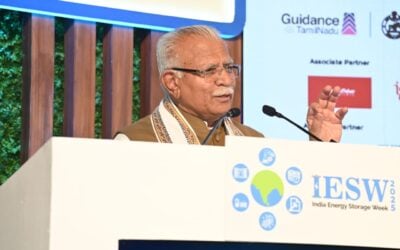
The US Department of Energy (DOE) has launched 140 programmes to advance equitable development of climate, sustainability, and health measures, including a US$5 billion grid resiliency grant.
The announcement was made yesterday that the programmes in support of President Biden’s Justice40 initiative are underway. Funding is being unlocked through the historic Bipartisan Infrastructure Law (BIL) legislation that Biden was able to pass through last year, committing billions to overhauling the US’ infrastructure with targeted investments.
Enjoy 12 months of exclusive analysis
- Regular insight and analysis of the industry’s biggest developments
- In-depth interviews with the industry’s leading figures
- Annual digital subscription to the PV Tech Power journal
- Discounts on Solar Media’s portfolio of events, in-person and virtual
Through Justice40, at least 40% of improvements in areas including climate mitigation and clean energy, water quality and housing will benefit disadvantaged communities.
Key among these, from an energy storage perspective, are US$5 billion in grants for the ‘Preventing outages and enhancing the electric grid,’ which was first announced in January. It will offer funding to the likes of electric grid operators, electricity storage operators, generators, transmission and distribution entities, fuel suppliers, states and tribes.
They will be able to use the money towards activities that supplement existing efforts to increase resiliency of electricity supply as well as reduce the likelihood that wildfires are caused or exacerbated by electric infrastructure. Efforts should also reduce the likelihood of outages and disruptions.
A Request for Information (RFO) is available from the Federal Register here and the DOE anticipates that the programme will open for applicants in the third quarter of 2022.
Along with grants to help local authorities and tribal nations to reduce fossil fuel use and improve energy efficiency worth US$550 million and other programmes, electrification programmes for buildings and much more, a DOE press release highlighted that US$10 million financial assistance will be available to states, utilities, tribes and academic institutions towards design, permitting, technical studies and other aspects of siting and building pumped hydro energy storage (PHES) systems in their region.
The full list of BIL-enabled programmes that support Justic40 aims includes several funding opportunities Energy-Storage.news readers may already be aware of.
The newly established DOE Office of Clean Energy Demonstrations for example is funding pilot programmes for energy storage technologies, (US$355 million grants) and a long-duration energy storage demonstration and joint development scheme (US$150 million). Again, both are expected to open for applicants in the third quarter of 2022.
You can read the full list of funded programmes here.
US$2.5 billion loan kicks off battery manufacturing support
In related news, the DOE’s Loan Programs Office has made its first conditional commitment to support the battery manufacturing industry.
Ultim Cells, a joint venture (JV) between carmaker General Motors (GM) and battery company LG Chem, looks to be getting a loan worth US$2.5 billion from the Loan Programs Office (LPO) for the construction of three new lithium-ion battery factories in Ohio, Tennessee, and Michigan.
It will help supply cells to support GM’s manufacture of a million EVs in North America by the end of 2025 and create 6,000 construction jobs and 5,100 operations jobs at the factories themselves. Ultim makes nickel cobalt manganese aluminium (NCMA) chemistry battery cells.
Although the investment directly supports electric vehicle battery manufacture and not stationary energy storage systems, DOE noted that the Federal Consortium for Advanced Batteries – a group of four federal agencies banded together – has identified grid storage as one of the key end markets for lithium batteries.
The BIL funding will also inject US$7 billion into critical minerals supply chains for the battery industry, including components, materials and recycling businesses.
The DOE’s Loan Programs Office had lain dormant during the Trump presidency but reopened with sustainable infrastructure investor and solar industry veteran Jigar Shah at the helm. Its first loan offer, made a few months ago, is to the 300GWh Utah ACES green hydrogen storage project, the consortium behind which will borrow US$504 million.






